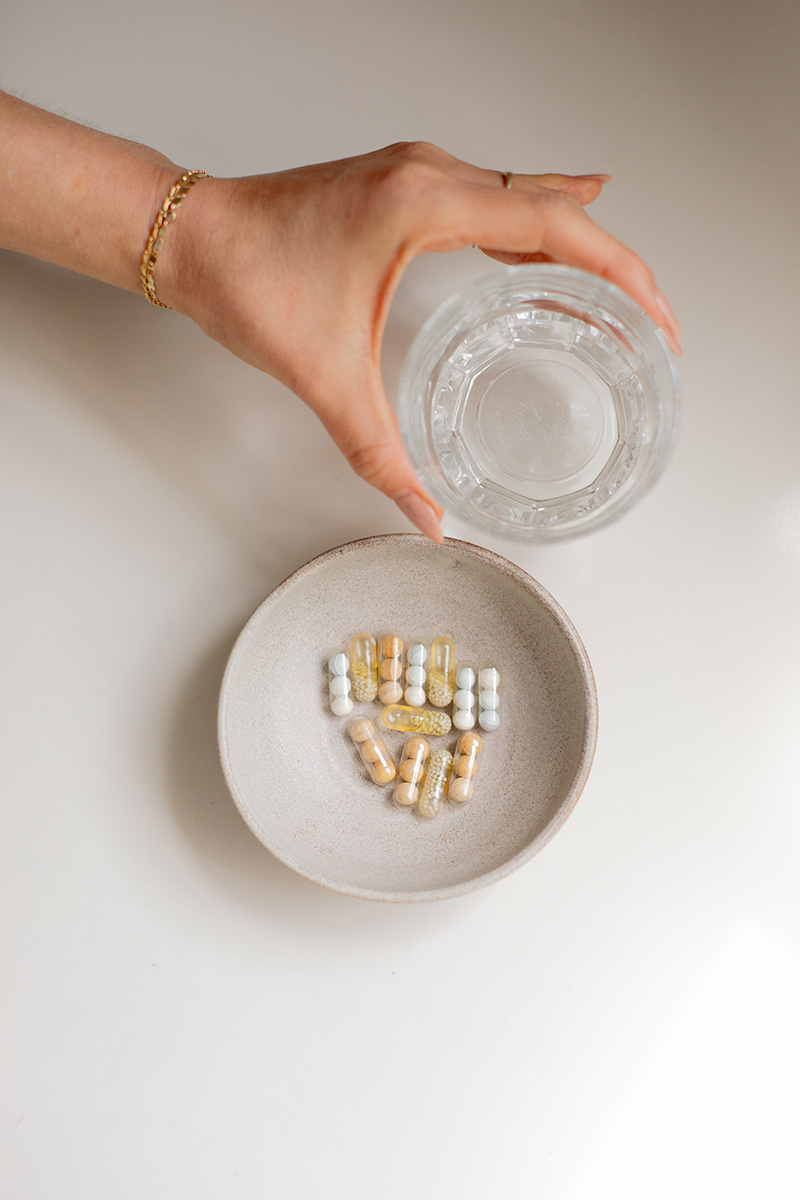
The Importance Of Nutrition In Postpartum
When I talk with mothers in my community, the one constant is how hard their postpartum experience was: Whether it was not having support for their healing, the ups and downs of breastfeeding, or being too exhausted to focus on self-care. During the period after giving birth, women felt that their needs were not being met in some way.
“During the period after giving birth, women felt that their needs were not being met in some way.”
For me, it was nutrition. I didn’t know how to feed myself while I poured everything (including all my breast milk) into our newborn. I had prepped postpartum meals and snacks and even set up a meal train, but eating felt like too much. Unlike some mothers, who are hungry while breastfeeding, I lost my appetite. I had to be forceful and diligent about eating. I lost my pregnancy weight right away. I struggled to make enough milk and had some postpartum depression. It was a challenging time, to say the least.
After six months, my hair started falling out. Even though this is a very common occurrence called telogen effluvium, I understood it as my first sign of nutritional depletion. It was then that I decided something needed to change. I started by adding meat back into my diet. At that point, I’d been a primarily plant-based pescetarian for five years. But this type of diet simply did not sustain me postpartum. With my hair falling out and my milk supply diminishing, I did some research and found what my body needed most was fats and protein to heal and rebuild.
“Nutrition is a cornerstone in this journey, offering not only physical recovery but also emotional stability, fostering a holistic approach to postpartum care.”
– Kayla Thorngate RDN, IBCLC, PMHC of Nourished Mothers
When I look back, my postpartum nutrition journey was shrouded in mystery. Luckily there are many resources for understanding how to care for ourselves during this crucial time. To deepen our understanding of postpartum nutrition, we talked to Kayla Thorngate. She’s an RDN, IBCLC, PMHC, and founder of Nourished Mothers. She is also a nutrition and lactation consultant specializing in coaching and supporting mothers about the role nutrition plays in mental health. “Recognizing and addressing the unique challenges faced by new mothers is essential for their well-being,” she told me. “Nutrition is a cornerstone in this journey, offering not only physical recovery but also emotional stability, fostering a holistic approach to postpartum care.”
Finding the time to heal
Postpartum healing is often overlooked in the West. Society isn’t set up for the amount of care the new mother and baby need.
Yet, it wasn’t always like that. Before the 1900s, women gave birth at home with a midwife, and her community provided care for her. After 1900, though, hospitals became more common. This shift provided better care to some, but it sadly de-emphasized the need for enough rest, good food, and time to heal after the baby arrives.
Some of us are starting to reclaim our need for rest and recovery, learning from the wisdom from Eastern traditions. For example, the Chinese practice of Sitting the Month or The First Forty Days are practices that call for prioritizing adequate time for healing. The new mother and baby create a cocoon around themselves. They don’t leave the house. They ideally stay in bed, eat in bed, and are cared for by friends and family.
“Whether you have a hospital birth or a home birth, the idea is that postpartum is a time to heal.”
Of course, this isn’t always possible with jobs, city living, maternity and paternity leave. Yet these practices help put into focus the importance of care for both the mother and baby during this precious time. Whether you have a hospital birth or a home birth, the idea is that postpartum is a time to heal. Like any other massive event that happens to the body.
In preparing for postpartum, the key is mentally preparing that you will be healing. Prepare for this time of healing in the ways that feel most supportive for you. Reach out for community support and take the time to meal prep. However, if you’re like me and what to eat for postpartum feels overwhelming, Thorngate shares her expert wisdom below.
How nutrition impacts postpartum
During pregnancy, the body provides the growing baby with all that it needs, while also undergoing a significant number of changes to prepare itself for delivery. After giving birth, the body must work to recover and repair itself and, if breastfeeding, also provide all the hydration and nutrition a newborn needs for healthy development. This is why the postpartum period is often called the Fourth Trimester, because the body is still changing and adapting.
“The postpartum period is often called the Fourth Trimester, because the body is still changing and adapting.”
Thorngate shares, “Nutrition plays a pivotal role in supporting new mothers as they navigate the challenges of postpartum. It goes beyond just nourishing the body; it’s a cornerstone for healing and thriving during this transformative period. Adequate intake of essential nutrients, tailored to the unique needs of postpartum mothers, contributes to physical recovery, energy restoration, hormonal balance, and improved mental health. Eating a diet that prioritizes nutrient-dense foods promotes healing, supports lactation, and replenishes vital nutrients depleted during pregnancy and childbirth.”
Nutrition impacts our mental health. This is especially true as our body is going through a whirlwind of hormonal changes after birth, often leading to anxiety and depression as the body tries to find balance.
Tips for postpartum nourishment:
- Incorporate nutrient-dense foods like quality-sourced animal proteins (from both land animals and seafood), cooked vegetables, grains and starches, and healthy fats. Animal foods contain high amounts of many of the nutrients required of us during this nutritionally-expensive season of life (especially if you add breastfeeding into the mix).
- Prioritize hydration on a cellular level with water, mineral-rich bone broth, herbal teas, and electrolytes. You may also want to consider incorporating trace minerals into your diet, especially if you filter your water.
- Magnesium is an important mineral we are often deficient in due to high-stress levels, low amounts in our food, and soil depletion from farming practices. Many mothers feel better after incorporating this mineral into their diet through oral supplementation, magnesium lotion or sprays, or adding magnesium flakes to a warm bath. (Always consult with your provider before adding any new supplements to your diet.)
- Simple recipes like mineral smoothies, nourish bowls, and sheet-pan or slow-cooked meals help streamline meal planning and ensure you’re getting a steady stream of energy and nutrients throughout the day.
Some things to avoid postpartum:
- Minimizing your intake of cold foods (i.e. smoothies and raw vegetables) and incorporating more warm foods or spices can be particularly supportive for postpartum healing.
- Cooked foods are easier to digest, aiding nutrient absorption and providing comfort during this recovery phase. Including soups, stews, and warm broth or herbal teas can enhance the overall healing experience, promoting both physical and emotional well-being.
- While caffeine is a common staple for many mothers, its consumption in excess can worsen already-disrupted sleep patterns and increase anxiety — both common challenges in the postpartum period.
- Avoiding highly processed and sugary foods is advisable, as they can lead to energy crashes, impact mood stability, and weaken the immune system.
Creating a meal train with friends and neighbors is a great way to invite support from your community. Communicate what foods to avoid or that you’d most like to have on hand. For instance, we didn’t specify anything in our meal train and only received dinners, but what we really needed were pre-made breakfasts and lunches. We also received a lot of heavy pasta and cheesy dishes that were comforting but not as nutritionally dense.
“Remember, the postpartum time is a transformative journey — you can expect many ups, downs, twists, and turns.”
Remember, the postpartum time is a transformative journey — you can expect many ups, downs, twists, and turns. But by nourishing the body, you’re creating a foundation that’ll help you step into parenting healthier and more whole. For those looking for deeper postpartum support, with extensive nutrition guidance tailored to your specific needs, explore Kayla’s Well Mama Nutrition Coaching Program. Full Well’s practitioner directory also has a vast library of support — including The Food Doula and Love and Lullabies.
Courtney Jay is a Contributing Editor at The Good Trade. She is also a yoga instructor, health enthusiast, and sustainable fashion advocate. You can find more of her writing and take one of her online yoga classes on her website, Coincide.




